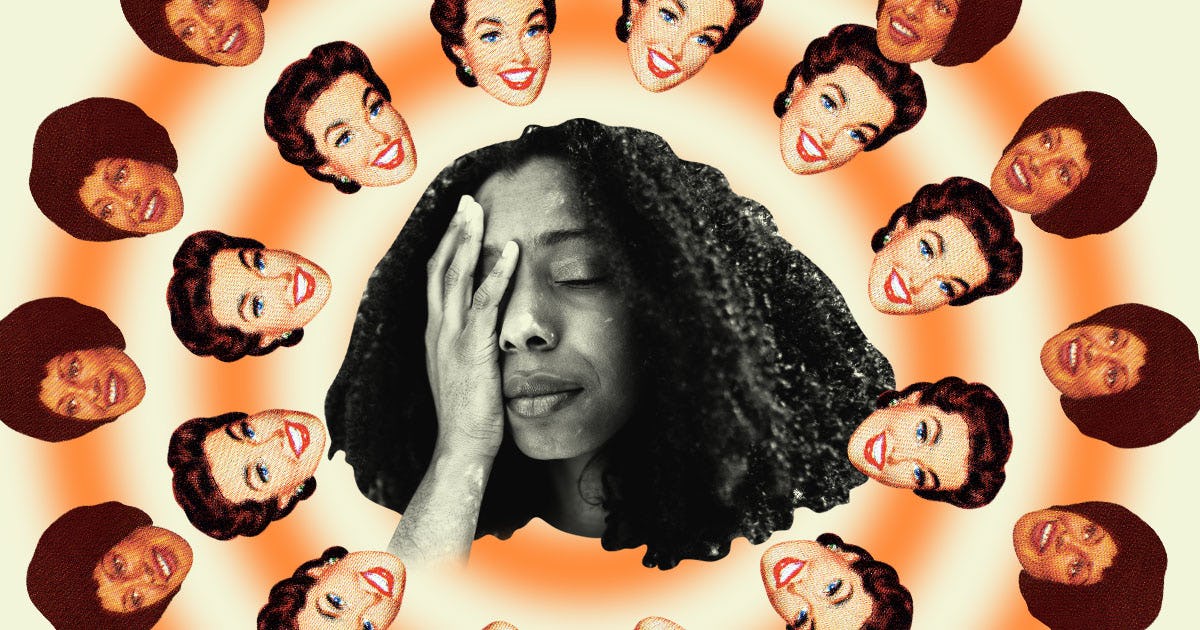The elementary school auditorium is already sweltering by the time I wedge myself into a random empty seat between two dads in puffer vests. Every parent in town seems to be here, fanning themselves with programs and craning for a glimpse of their kid. I spot a few familiar faces and feel my pulse quicken. My son’s up there, back row, scanning the crowd for me. I lift my arm to wave, pretending to be composed, the kind of mom who relishes these things. At that moment, I’m deeply grateful for the edible I took earlier.
Of course, I’m proud anytime I get to witness one of my children’s accomplishments. But the microscopic snowglobe small talk, the polite nods, the murmured updates about vacations, real estate, and birthdays, makes everything feel as if it’s shrinking around me.
I’ve always been a worrier, but over time, the unease I carried became heavier, sharper, something I would one day name as an anxiety disorder. My brain runs its quiet inventory: where to look, when to clap, how to stand without looking awkward when it’s over. It’s exhausting, this choreography of appearing at ease.
I’m the kind of person who replays conversations in my head, wincing at the things I wish I’d said differently, the jokes that fell flat. I notice the way someone’s smile flickers, the subtle shift in tone when they’ve had enough of me. I know that look, the one that says I’m too much, too loud, too eager. It used to just sting; now it burrows.
I grew up halfway across the country, in a place where no one knew my ex-husband, where I wasn’t defined by someone else’s history. Here, I’m raising my kids in the town that raised him, surrounded by people who’ve already chosen sides, even if they don’t mean to. Since the divorce, that quiet sense of being misplaced has only intensified. Community events that once felt tolerable now leave me restless, hyper-aware, scanning for somewhere to stand that doesn’t feel like standing out.
Being gregarious, friendly (mostly), extroverted, and involved in the community makes it easy for people to assume these social situations are second nature to me. The truth is more complicated. Beneath the jokes, the stories, the practiced ease, my nervous system is thrumming like a live wire. Just because I live a public life doesn’t mean the performance comes without cost. It’s a careful, exhausting balance between being seen, being present, and keeping the anxiety hidden from everyone, including my kids.
I used to think my kids didn’t notice the small signs of my anxiety: the tight jaw, the restless hands, the forced smile when I didn’t feel like it. What I didn’t realize was that they also felt the less visible parts. The moments I zoned out mid-conversation, when my responses came slower or sharper than I meant them to, the impatience that crept in when my nervous system was stretched thin. They felt it when I snapped over something small, when I couldn’t focus or keep track of time, when I was physically present but mentally miles away.
Pretending only made it harder for them to understand and regulate their own feelings. When my words said one thing but my energy said another, it created a mismatch they couldn’t make sense of. Instead of feeling reassured, they absorbed the tension and it ended up causing them more stress than if I had just been honest in the first place.
Realizing this forced me to rethink how I showed up for them. If I wanted them to learn emotional regulation, I couldn’t just act calm or push my feelings aside. I had to name them (who knew there were so many?), work through them, and let them see me doing it. That meant explaining what anxiety can look like, what it feels like, and how to cope. How to get comfortable being uncomfortable.
The most convincing performance I’ve ever given as a parent was pretending to be fine when I wasn’t. Over time, I realized that pretending wasn’t enough—not if I wanted them to navigate their own emotions in a healthy, grounded way.
That work on myself also forced my hand in being honest with them. I couldn’t just hide behind smiles and applause anymore; they deserved a parent who could model the reality of anxiety, not just the performance of calm. I started explaining what anxiety feels like—how our brains can trick us, how our bodies respond, and how to recognize and cope with those signals. I let them see the moments when I struggled, and I talked through how I worked to manage it. I stopped pretending. I stopped hiding. And in doing so, I realized that showing up authentically was what mattered most.
Learning to be honest with them didn’t erase the anxiety, but it changed how I carried it. I still feel it in moments like this, sitting in a crowded auditorium, trying to quiet the noise long enough to be fully present. I show up for them even when every cell of me wants to disappear. I keep pretending I belong here, because the alternative, letting my anxiety dictate my presence, would leave them feeling my absence before they could understand it.
Parenting with anxiety is invisible work. No one sees the effort it takes to stay grounded. It’s not an act; it’s love disguised as composure, a choice I make again and again.
After the concert, the hallway fills with families and chatter. I stand back, waiting for my kids to find me. My son saunters over, cheeks flushed from the stage lights. “Did you see me, Mom?” he asks. I did. I saw him. And in some small, quiet way, I saw myself too: still here, still trying, still showing up, still never quite feeling like I belong, even when it feels impossible.
Because anxiety doesn’t diminish love; when you choose to embrace the discomfort, it forces that love to survive in its own fierce, relentless way.
Molly Wadzeck is a freelance writer and mother of three. Born and raised in Waco, Texas, she moved to the Finger Lakes region of New York, where she worked in animal rescue and welfare for many years. She writes essays and poems about feminism, mental health, parenting, pop culture, and politics. She is usually late because she stopped to pet a dog. She tweets at @mwadzeckkraus.
Disclaimer: This content was automatically imported from a third-party source via RSS feed. The original source is: https://www.scarymommy.com/parenting/social-anxiety-is-exhausting-especially-as-a-mom. xn--babytilbehr-pgb.com does not claim ownership of this content. All rights remain with the original publisher.


